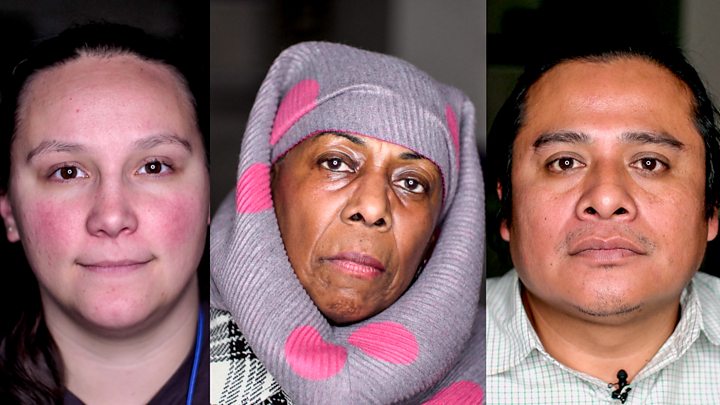How online extremists shape minds of white teens
A mother expressed her concern about extremist content poisoning the minds of boys as they use the internet, in a post that went viral. She thinks there are warning signs parents should heed.
In an age where anyone can access just about anything on the internet, white boys in the US seem particularly at risk from dangerous radicalisation online.
Many mass shooting suspects in the US have three things in common: They are young, white and male.
The suspect behind the El Paso shooting that killed 22 people in Texas is believed to have posted a racist manifesto online.
Police investigating a deadly attack in Dayton the following day said the gunman was influenced by a “violent ideology”, although no motive has been disclosed.
The dangers of the internet are not a novel talking point for parents and teachers, but these most recent tragedies have sparked renewed debate over what families can – and should – do when it comes to raising white boys in America.
“The red flags started going up for us when, a year or so ago, [our kids] started asking questions that felt like they came directly from alt-right talking points,” says Joanna Schroeder, a Los Angeles-based writer, media critic and mother of three.
She tells the BBC one of her two sons began to argue “‘jokey’-toned alt right positions”, asking questions like why black people could “copy white culture but white people can’t copy black culture”. She began learning about how other boys their age were sharing sexist and racist memes – likely spreading from online forums.
Last week, Ms Schroeder’s Twitter thread about parenting white boys in a world rife with easy access to extremist viewpoints by monitoring their social media and teaching empathy became a widespread talking point, amassing nearly 180,000 likes, 8,500 comments and shares across social platforms.
In July, FBI director Christopher Wray told the Senate that the majority of domestic terrorism cases were “motivated by some version of what you might call white supremacist violence”.
Sociology Prof Margaret Hagerman at Mississippi State University spent two years studying a group of affluent white families and the way they discussed and taught about race.
Prof Hagerman says she was surprised to learn that many of these parents believed their children had no ideas about race and were “colourblind”.
“When I spent time one-on-one with the kids or when they were with friends it was very apparent they had all kinds of ideas about race, racism and inequality,” she says. “Children are learning about race in America through all different aspects of their everyday lives.”
She says parents should think about how they construct their child’s upbringing, and how living in a primarily white neighbourhood and going to a primarily white school, for example, might “convey particular messages” that leave children unprepared to deal with encountering things like white supremacist ideologies online.
“I often hear parents tell me they feel uncomfortable talking about racism with other adults. I’m struck by that, because if white adults can’t have conversations about racism in America with other white adults, I don’t understand how they think they’re prepared to have those conversations with children.”
Mr Rademacher described one group of white boys in his classroom who repeatedly mocked race, gender and sexuality in a way he believes came from online forums. Scolding did nothing to curb the behaviour, so Mr Rademacher invited them for a discussion over lunch instead.
One student told him that “as white boys, they were so consistently worried about being called racist that they made jokes to each other within their private group chat almost as a form of gallows humour – to toy with the thing that they were most scared of, felt the most attacked for.”
Mr Rademacher says that after a conversation about how to share their feelings, some of the boys even joined the school’s anti-racist leadership group.
“They’re still young boys,” Mr Rademacher emphasises. “They’re trying to figure out where the line is. Why things are funny and why things are offensive.” And white teenagers are “ripe for radicalisation” now amid broader cultural changes that make them “feel like they’re under attack” from mainstream society, he says.
Meme-culture, gamer-culture and white nationalist culture can overlap and inform each other, he adds, and it’s all too easy for them to start with one and travel to the other without knowing it.
What can be done?
Ms Schroeder says parents need to intervene because children will not often stop to critically examine the arguments they hear online. Ask where they heard the remark and say you want to understand the context, she suggests.
“I always try to start with, ‘I know you never want to hurt anyone, so I want to explain to you why that joke isn’t appropriate and why it’s hurtful. That way you’ll know why we don’t want you to say that again.'”
Mr Rademacher says it’s important teachers keep in mind that parents can get defensive too if their children are shamed. “Emailing a parent and saying I think your kid is going to be a white nationalist – that’s irresponsible.”
But many parents are worried about what their children have access to online.
“The dumb mistakes we used to make are now the dumb mistakes that make you national news for a week. So if you can have parents be partners in that situation it’s a lot better.”
Mr Rademacher says that implementing some of these ideas into a yearlong curriculum would be an easy way to tackle internet radicalisation. But parents who fear it would be “anti-white” are mistaken.
“What I mean is the classroom can be a place where kids can explore without being shamed. When we apply shame to a group we are pushing them down a much more negative path.”
In Ms Schroeder’s words: “Our kids need to know that we expect them to be kind, respectful and honest – not because we think they aren’t those things already – but because we know that they have innate goodness inside of them.”
Do any of these issues affect you as a parent or student? Send us your thoughts using the form below.
If you are happy to be contacted by a BBC journalist please leave a telephone number that we can
contact you on. In some cases a selection of your comments will be published, displaying your name as
you provide it and location, unless you state otherwise. Your contact details will never be published.
When sending us pictures, video or eyewitness accounts at no time should you endanger yourself or others,
take any unnecessary risks or infringe any laws. Please ensure you have read the terms and conditions.
Terms and conditions
The BBC’s Privacy Policy
Source: Read Full Article




